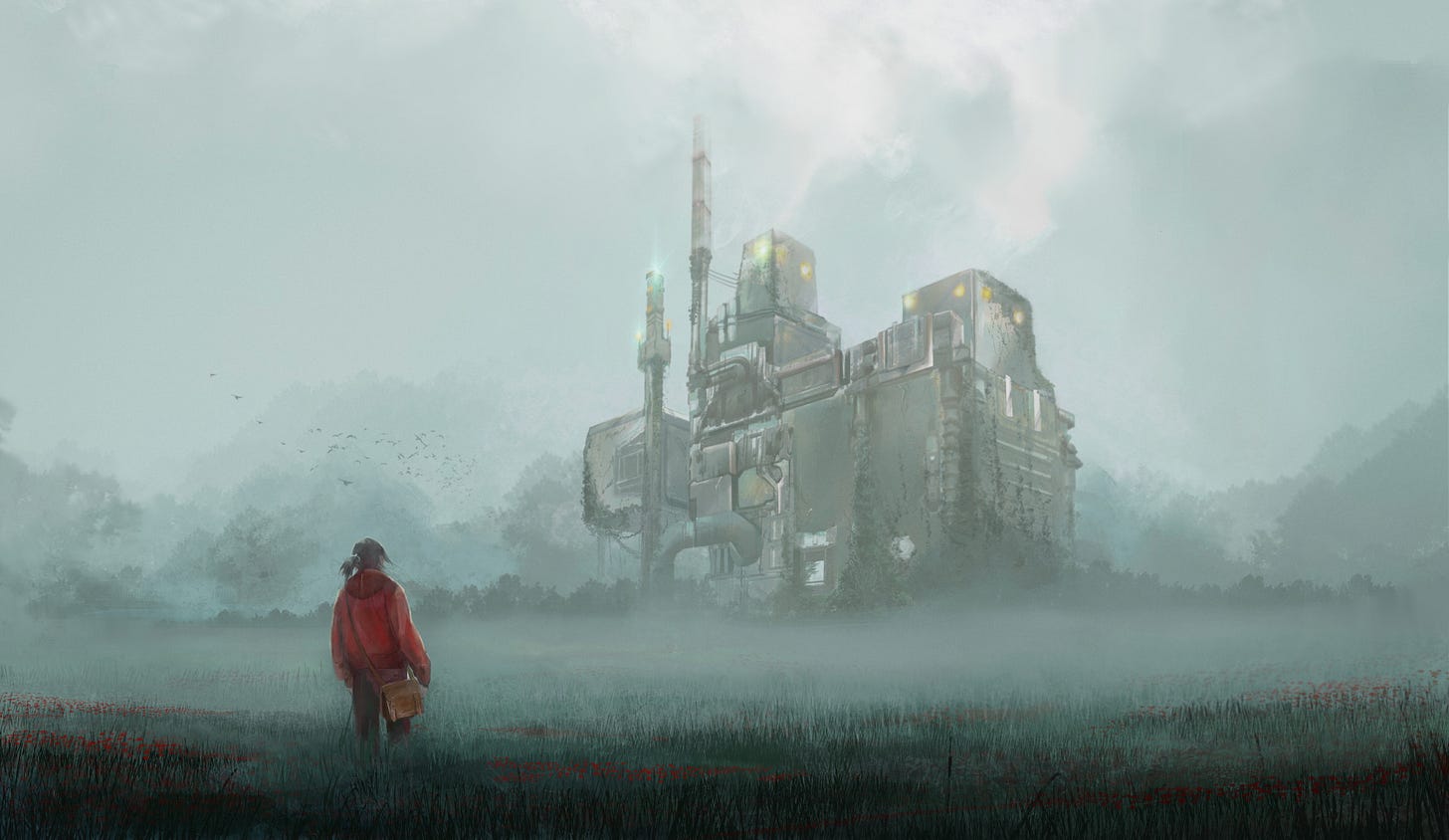She had gained confidence once she left the house and was on the road, as she always did. The familiarity of her backpack’s weight and of her comfortable sneakers hitting the ground helped to drown out everything that had happened. She told herself it was just a journey, not a mission to save her brother’s life, and to a place she had never been before. In a life lived on foot, the opportunity to travel someplace truly new was enticing. She was headed, after all, to one of the few places her mother had explicitly forbade her from exploring. She could not quite make herself enjoy it, but for awhile the endless silent pull of the horizon was sated.
The trip was slow and tiring. She arrived exhausted, but she arrived safely; those conditions were not unrelated. Haojing had undertaken every precaution she knew, staying off of obvious paths, doubling back in case she was followed, perpetually scanning for motion, moving towards her destination like a sailboat tacking into the wind. As a little girl her father had sat with her as she watched a butterfly’s strange path through the air, dipping and swerving endlessly. It was a defense mechanism, he had explained, in that wonderful way of his, his hand playing in the light as he mimicked the movements.
“It’s dangerous, you see, to fly in a straight line,” he had said. “If you move in a straight line they know where you’re going, and they can be there waiting for you. The butterfly knows better.”
She had never forgotten that insight, one of those odd but invaluable lessons he had taught her, and she had applied it in her explorations until it became second nature. Still, all that extra walking took its toll. Her clothes chafed at her, her feet had blistered, and her shoulders ached with the weight of her bag.
Now, at the base of the tall hill on which Big Flat was said to reside, the fear came rushing in.
The name “Big Flat” was an artifact of the supercomputer’s unique construction. Its microarchitecture was completely ahierarchical; the marketing term had been “Truly Horizontal Computing.” What that really meant, computationally, was lost to time. Even when the developers were alive, the exact nature of Big Flat’s data pipeline was an industry secret, one that the developers had likely taken to their graves. Up north was where things had gotten the worst. Few people had been spared, and so few were left who might know Big Flat’s secrets. All anyone really knew was that they had achieved quantum computing performance without quantum computing drawbacks, an achievement that would have made the company immensely wealthy, had the world not fallen apart. But the machine had outlived its creators, and now stood as a monument to another era. Perhaps it could have served as a means of renewal, had everyone not been so afraid to approach it. People knew two things about Big Flat: it knew everything, and it would kill you.
Of course she had heard the stories Mac had mentioned. Every child had. Big Flat was one of the great boogiemen of their world, a giant computer, insatiable for energy, gobbling up children for their precious life force. She reminded herself again that this was a farce. She had climbed into her bed with her mother in terror, as a child, after her cousin had told her the story of Big Flat. Irritably, Chien-yi had told her that trying to extract electricity from humans was just about the least efficient way for a computer to do so. Besides, she had said as she carried Haojing back to bed, Big Flat probably had its own nuclear plant. It was rumored, after all, to control the bombs.
It was that rumor – that the military had entrusted much of its computing capacity to Big Flat’s developers – that really did worry her. With that responsibility came layers of protection: defensive capabilities unlike any seen in the history of computing, and a hardwired, ruthless commitment to self-preservation. The computer’s installation in a facility buried deep in the side of a rocky hill was no coincidence. Nor was the fact that it had (supposedly) survived for all of these years. Haojing did not fear some childish story of a child-eating computer. A hyperactive defense system was a different story.
There was one advantage to all of this: she was truly alone. She had spotted several people on her trip, including some rough looking characters, and had taken care to give them a wide berth. But the closer she got to her destination, the fewer the signs of humans. Whether because of superstition and myth or out of rational fear of a very powerful machine, it appeared few were willing to be this close. Still, at dusk, she felt compelled to finish her journey. She had no desire to spend the night in this place.
The road that snaked up the hillside was in surprisingly good condition, the asphalt baked grey and dotted with grass but otherwise undisturbed. But Haojing shunned it anyway, sticking to the undergrowth, following the road but never coming within 10 meters or so of its surface. Even out here, to be that exposed under the rapidly-disappearing sun was a risk she could not take. Still, she met with no resistance and saw no obvious sign of defensive fortifications. Here and there sat old military cargo containers on the pavement, and she passed the rusting frame of a Jeep pulled off to the side, but otherwise there was nothing but vegetation and asphalt.
She was beginning to wonder if the entire story was a myth when she saw the first cannon. It was fortified, military hardware, built on a tall platform that looked down at the road below. A bank of cameras sat on top of the gun, housed in a thick transparent enclosure. The moment she had spotted it, she had thrown herself into the bushes, pinning herself to the ground. After a few agonizing moments she had crawled forward on her belly, gathering scrapes and thorns for her trouble, until she could see the cannon again. It sat unmoving. When she had gathered the nerve, she threw a stone right past the cameras, to see if it might trigger some movement. Nothing. As she moved closer she saw that the camera’s enclosure was covered in dust; cobwebs hung from the cannon to its mount. At last she emerged from hiding and walked up to study the gun. Its mechanisms to turn and aim were covered in grime; small vines snaked their way up its base.
She saw more defensive fortifications as she made her way up the hill. They were similarly lifeless. She gradually let go of her fear, though she still moved cautiously, mechanically approaching each checkpoint in stages as she had before. Finally, she approached the entrance. Lit by moonlight sat a tall fence, topped with razor wire, a thick gate padlocked shut. A warning sign, sun-bleached and crooked, declared the fencing electric. She dutifully tested it for power, tapping at it with a branch, throwing scrap metal from the ground in search of a spark, and was unsurprised to find it dead. She retrieved her wire cutters from her backpack and set to work. Serenaded by crickets and tree frogs, she slowly cut a path for herself.
It seemed to take forever, and by the end of her work she was covered in sweat, but at last she had her opening. Gingerly, she slid through; to acquire even a superficial cut, out there, would not be wise. She took a moment to catch her breath and look around. Something about the guard towers and fencing made her feel exposed, but there was no motion, no signs of life of any kind. She shouldered her bag and pressed on.
The giant steel security doors looked pristine. She and her mother had searched for salvage in an old bank vault once, gathering stacks of useless bills for kindling, searching through bags of coins for useful metals. The vault door had seemed impregnable, and somehow comforting, though it also looked comic when viewed from a gaping hole in the bank’s crumbling walls. But that door had nothing on this massive military installation, which sat utterly unmarked by corrosion or damage. It must have been two feet thick. There was no obvious locking mechanism, no place to insert a key or to enter a code; Haojing guessed that it must have used some sort of wireless entry system, a proximity sensor for the right ID card, maybe. It appeared utterly impregnable, built to withstand wars, climate change, and the passage of time. It was also open. The door was stopped a few feet from its terminus, just wide enough for a person to walk through. Overcome with both gratitude and suspicion at this good fortune, Haojing was unsure of what to do. Everything about it suggested a trap. With no other options presenting themselves, she walked inside.
Now lit only by a thin crack of moonlight pouring in from the opening, Haojing fished her old dented policeman’s flashlight from her bag. It was heavy in her pack, and anything that operated on batteries was a strategic risk, but here she felt washed in gratitude for having lugged it along. She swept the flashlight’s beam around her. The corridor was long and empty, save for another guard station embedded in the wall to her right. Thick security glass stood between her and a room hung with monitors, all of them powered down. She ruefully eyed a rack of assault rifles that hung from the wall; her entire family could eat for the rest of her life for what she could get in exchange for them. But the station was locked, the glass thick, and anyway there was no way she could transport even a couple of them on the long journey home.
The entrance corridor seemed to go on forever. She was frightened, of course, to be walking alone down a pitch-black hallway, but her curiosity and her mission pulled her along. Finally she reached the end, an utterly nondescript office door set into the wall. She was at least 200 meters deep into the hillside. For a moment she hesitated, then turned the door handle, which gave way without issue. Inside was another hallway, but one that seemed entirely incongruous with the one that came before it. In sharp contrast with the industrial metals of the entrance corridor, the interior hallway looked like it had been ported directly from an office park. Haojing swept her flashlight in both directions. Beige carpet lined the floor, banks of fluorescent lights ran along the ceiling, and the nondescript walls were dotted with inoffensive corporate artwork. As she cast about, trying to decide which direction to go, Haojing closed the door behind her. Tacked to the back of the door was a fire escape plan with various areas marked – Administration, Programming, Security, Cafeteria, Physical Plant, etc. She pull the map from the door, studying until she recognized her own position, then walked off in search of the room marked Terminal.
Table of Contents and instructions for subscribing to just this serialized novel here. Illustrations by Vika S. If you enjoy this novel, consider leaving a tip. Tips will be split equally between the author and illustrator. Sign up for fredrikdeboer.substack.com here.
©2019 Fredrik deBoer



